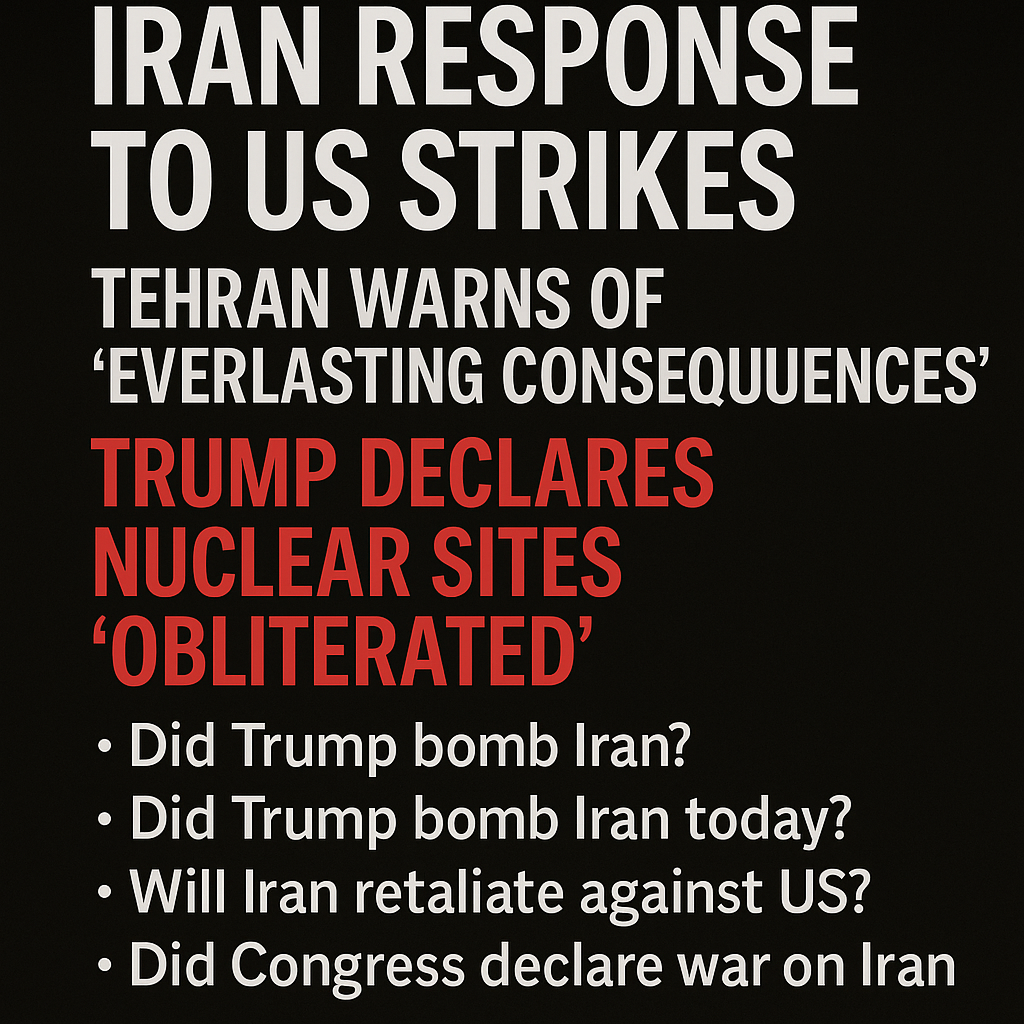WASHINGTON, June 22 – What will be Iran Response to US Strikes? President Donald Trump, who returned to the White House in January vowing to be a “peacemaker,” has taken one of the boldest steps of his presidency, confirming that U.S. forces bombed Iran’s key nuclear facilities—Fordow, Natanz, and Isfahan. The move answers the question many were asking this weekend: “Did Trump bomb Iran today?”
In a live televised address, Trump called the mission a “spectacular success”, stating the sites were “obliterated” in a high-precision strike. Flanked by Vice President JD Vance, Secretary of State Marco Rubio, and Defense Secretary Pete Hegseth, the president warned Iran of future strikes if it refuses to abandon its nuclear ambitions.
“There are many targets left,” Trump said. “And we will go after them—with speed, precision, and skill—if necessary.”
Iran’s Response to US Strikes: ‘Everlasting Consequences’
Within hours, Iran condemned the attacks and vowed to respond. The Foreign Ministry warned of “everlasting consequences” and accused the United States of military aggression. Iran’s Supreme Leader Ayatollah Ali Khamenei reiterated that the country would retaliate.
Global attention now turns to the likely Iran response to US strikes—a major concern given Tehran’s military reach and its network of regional allies.
Iran’s Atomic Energy Organization downplayed the damage to Fordow, saying only minor harm occurred. However, international experts remain cautious, warning that Iran could retaliate against US interests both in the Middle East and beyond.
“If Iran feels its survival is threatened, retaliation could be swift, asymmetric, and far-reaching,” said Jonathan Panikoff, a former U.S. intelligence official.
Did Trump Bomb Iran Without Congressional Approval?
The dramatic escalation has sparked legal and political backlash at home. The phrase “Did Trump bomb Iran?” surged online as Americans sought confirmation of the strike. Meanwhile, lawmakers raised alarm over the fact that Congress did not declare war on Iran, fueling constitutional concerns.
“The president has launched a major military attack without congressional authorization,” said one Democratic senator. “This demands immediate oversight.”
The search term “Did Congress declare war on Iran” trended on social media as questions mounted over the legality of the operation.

IRAN RESPONSE ON US STRIKES
Two Weeks Became Two Days
Earlier this week, Trump had warned Iran to surrender within two weeks. But in a sharp turn, he ordered the strike just two days later, leading many to speculate whether the negotiation window was a feint or if backchannel diplomacy had collapsed.
The president’s special envoy, Steve Witkoff, was reportedly engaged in behind-the-scenes talks, but there’s no indication they led to a breakthrough.
Will Iran Retaliate Against the US?
That is now the world’s biggest question: Will Iran retaliate against the US following direct American strikes on three of its most critical nuclear sites?
The risk of escalation is high. The UN Secretary-General António Guterres warned of a “spiral of chaos” if diplomacy fails. Observers say that a full-scale conflict would not only destabilize the Middle East but also risk drawing in global powers.
Despite Trump’s claims that this was a one-time, surgical operation, many worry that the U.S. may now be committed to a deeper, unintended conflict.
“Trump appears to believe this strike will bring Iran to the negotiating table,” said analyst Richard Gowan. “But it’s more likely to push Tehran further away—and closer to retaliation.”
A Risky Move from the ‘Peacemaker’ President
Saturday’s airstrikes stand in stark contrast to Trump’s first term, when he touted that he had started “no new wars.” Now, he may be opening a volatile new front in the Middle East, one that his supporters on the “America First” side hoped to avoid.
The president’s decision to stand alongside hardline voices like Rubio and Hegseth may signal a pivot from non-interventionism to confrontation.
If this proves to be a singular event, Trump might retain support. But if the strikes lead to a sustained military conflict, it could alienate parts of his political base and provoke international backlash.
“Trump made his move,” said one foreign policy analyst. “But whether it leads to peace—or war—now depends entirely on Iran’s next steps.”





